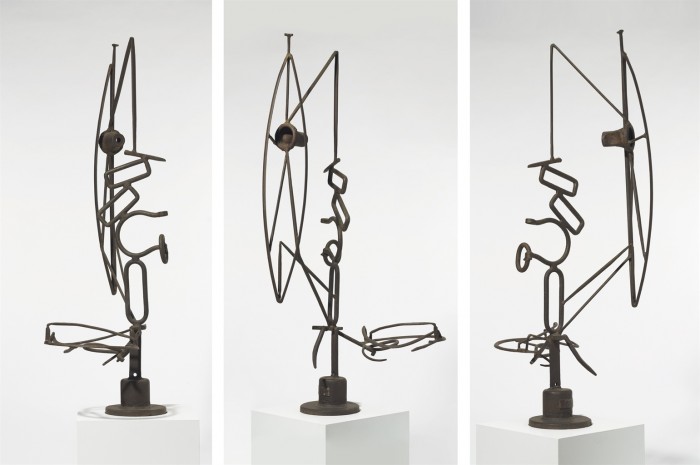New acquisition for SAAM
The American Art Museum recently announced it is acquiring David Smith’s Agricola IV, a ground-breaking sculpture by one of the country’s most important artists. Agricola IV is a major addition to the museum’s presentation of American art in the 20th century. Sculpture Curator Karen Lemmey offers some insight into Smith’s work.

Agricola IV, David Smith, 1952, steel, 60 x 32 1/4 x 15 1/2 in., Art © The Estate of David Smith / Licensed by VAGA, New York, NY, Photo © Christie’s Images/Bridgeman Images. Promised gift from Sam Rose and Julie Walters.
In the mid-1930s, David Smith began creating sculptures by joining found objects together into assemblages, relying on skills gained from working as a welder in his youth at a Studebaker automotive plant in Indiana. He was the first American to sculpt directly in metal, a technique pioneered in the late 1920s by avant-garde European artists Julio Gonzales, Pablo Picasso and Alberto Giacometti. Smith’s early constructions, made from tools, metal plate and other utilitarian objects, radically challenged American notions of sculpture—especially the art deco aesthetic of Paul Manship’s stylized figures that dominated American galleries and public spaces in the 1930s.
Smith’s Agricola series, titled after the Latin word for farmer, consists of 17 sculptures constructed from discarded farm tools and machinery that he harvested on the farmland surrounding his studio and home in Bolton Landing, New York. Agricola IV rises up from its cylindrical footing and stands like an idol from a heroic agrarian American past, one that had faded by the post-war era. Smith claimed that the obsolete tools he selected had shed their original meaning and once incorporated into sculptures underwent “metaphoric changes…permitting a new unity, one that is strictly visual.” Smith often began a sculpture by tack welding together elements that he laid out on the floor of his studio, eventually pulling this linear core to an upright position and attaching appendages to create an open work construction in which “the front views through to the back.” The result is an elegant line drawing traced through the air in the improbable material of rusted iron.
Agricola IV is on display through April 10, 2016 in the exhibition Crosscurrents: Modern Art from the Sam Rose and Julie Walters Collection.
![David Smith, ca. 1942 (Photographer unknown.) According to a note from Dorothy Dehner, this photograph was taken as a publicity shot for a joint exhibit between herself and Smith at the Albany Institute of History and Art. From the David Smith miscellaneous papers, [ca. 1940]-1964. Archives of American Art, Smithsonian Institution.](https://torch.si.edu/wp-content/uploads/2015/12/AAA_smithdav_10306.jpg)
David Smith, ca. 1942 (Photographer unknown.) According to a note from Dorothy Dehner, this photograph was taken as a publicity shot for a joint exhibit between herself and Smith at the Albany Institute of History and Art. From the David Smith miscellaneous papers, [ca. 1940]-1964. Archives of American Art, Smithsonian Institution.
This is a slightly edited version of a post originally published by the American Art Museum’s blog, Eye Level.
Posted: 22 December 2015
-
Categories:
American Art Museum , Archives of American Art , Art and Design , Spotlight



